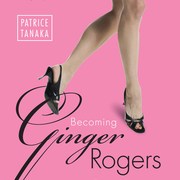 Photo: BenBella Books
Photo: BenBella Books
With the year drawing to a close and a fresh beginning on the horizon, there is no better time to examine the attitudes and strategies we adopt to cope with the vagaries of daily existence.
In her new memoir, Becoming Ginger Rogers: How Ballroom Dancing Made Me a Happier Woman, Better Partner, and Smarter CEO, Patrice Tanaka shares the story of how she committed to living in the present while putting joy in her life.
The shattering events of 9/11 are a backdrop to the beginning of Tanaka’s narration. The Twin Towers had been part of the view from her office window. She found herself repeatedly reflecting upon the losses experienced by those in the New York community—and the temporal nature of human beings. She was also dealing with her own struggles, both professional and personal.
Tanaka lays out the health challenges that she experienced from 1989 through 1990, and the illness of her adored husband, “Mr. Sweetheart,” who fought a cancerous brain tumor for fifteen years. During this period of time, she watched her spouse endure surgeries, radiation, and chemotherapy treatment. Tanaka became his caretaker, and despite the draining effects recognized a major message on the choice of how we experience life—“as a chore or as a joy.”
At the end of 2001, Tanaka was “exhausted and depressed.” A session in mid-2002 with an executive coach became a turning point for her when she was challenged with the question, “What is your grand mission in life, your true purpose on the planet?” Tanaka, still consumed by thoughts of those who had perished in the 9/11 attacks, kept focusing on the concept of living in the moment in a way that was meaningful. She told her coach that her specific meaning was to “choose joy each day.” When pressed to identify what brought her joy, Tanaka responded unequivocally, “Dancing.” She was given the assignment to book a dancing lesson for herself.
The reader follows Tanaka into the world of ballroom dancing, where her life was about to change in unexpected ways as she masters lessons on the dance floor that resonate far beyond new steps and winning competitions.
The text is punctuated with terpsichorean related quotes, “Intermezzo” pages that detail different dances from the Mambo to the Tango, and excerpted aphorisms from her revelations. Without a doubt, women will personally relate to the material. This includes the quest for perfectionism, apologizing too much, the need do put matters into context, and fear of failure or losing control. Through her dancing, Tanaka gradually morphs from a top PR executive who has carried the nickname “Ayatollah Tanaka,” to an in-the-moment “Samba Girl,” who can stop to celebrate her achievements and dance through her mistakes.
Eager to dig deeper into her insights, I spoke with Tanaka by telephone. She was open in discussing her personal transformation, telling me, “It’s about pursuing your joy. It will permeate your being. There is no downside!” Tanaka told me that she had written the book to help others and to communicate the key message, “Pursue your joy with a sense of urgency. Live out full and fiercely today with no regrets.”
I asked her to comment on the blocks that had hamstrung her and that remain problematic for so many women. On perfectionism she said, “It’s a fear based approach to life. We want to be perfect because we worry that if we make one mistake, people are going to stop loving us.” She qualified that path as a way of “disenfranchising others.” She explained, “Just because I make a mistake, doesn’t mean I’m a failure. Failures are stepping stones to success.” She specifically underscored how they could be applied to moving forward.
Regarding always putting other people’s needs first, Tanaka pronounced it a “female thing,” noting, “We want to make sure others are taken care of. We’re trying to be there 200 percent, and we put ourselves last.” In her business practice, Tanaka referred to the habit of giving more than 100 percent as “over-servicing.”
Underscoring the choice to choose between focusing on negativity or on blessings, Tanaka believes getting in touch with the gratitude can stop “the slide into the abyss.” One of the tips that she shared when we spoke was about creating a “joy calendar,” where you actively schedule two to three things per month to look forward to. In addition, every night she makes a mental note of the positive episodes of her day. She is a firm believer that “whatever we request and are mindful of, we generate.”
Tanaka’s instructor, dance champion Emmanuel Pierre-Antoine, repeatedly conveyed, “Focus on your present step and do it full-out, because your present step is what’s going to produce our next step.” When Tanaka became able to implement this advice into her dance work, she then translated that mindset into her corporate life. She connected to the concept of “manifesting” results rather than forcing them.
My favorite takeaways were: “Let’s try to make the best decisions we can in the moment; Just breathe; Let’s jump off that bridge when we get to it!”
At the conclusion of Becoming Ginger Rogers, Tanaka has reached the Silver level in Pro-Am ballroom competition. Her philosophy has evolved to using her energy in a more productive way. She has “aligned” the different facets of who she is to reinforce each other. Most importantly, she has reconnected with herself, physically and emotionally.
Before our conversation ended, Tanaka reiterated, “We must pursue our joy with a sense of urgency. We don’t have an infinite future.”
As we move into 2012, the target of “staying the in the present” with that joy is a valuable aspiration.
Edited by Jody Smith





Add a CommentComments
There are no comments yet. Be the first one and get the conversation started!